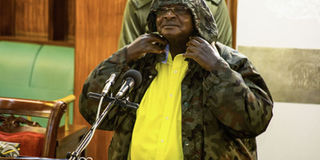Prime
Did Museveni’s security master plan answer questions of the day?

Reassuring Ugandans. President Museveni on Wednesday addressed Parliament on state of security in the country
What you need to know:
- At the peak of the women kidnaps and killings, Internal Affairs minister, Gen Jeje Odong, stunned Parliament and the country when he linked the killings to the mysterious “illuminati” religious sect.
- A security officer, who did not want to be quoted, said Mr Museveni’s 10-point strategy does not address issues of immediacy and practicality, leaving a populace that was already shaken by unexplained killings further uncertain about safety.
President Museveni’s 10-point security master plan that he touted as the magic bullet to the runaway killings left more questions than answers, with critics asking whether it will not suffer a stillbirth like his previous strategies.
Key among Mr Museveni’s 10-point strategy is proposals to fingerprint all guns in the country, install electronic number plates on all vehicles while motorcycle riders will have reflector numbered helmets.
Mr Museveni on Wednesday gave an unprecedented security address to a special Parliament sitting as he sought to allay the fears of stricken citizens.
Parliament had frequently demanded that the government provide answers about the killings but the Prime Minister and ministers of Defence, Security and Internal Affairs all kept dodging the questions, illustrating the complexity of the matter.
Ugandans have been living on the edge over the past five years as they have watched brutal killings manifested in different forms but with the cross-cutting narrative being the ease with which killers would easily pick off their victims and flee undetected.
Over the period of the surge in crime, the most rampant method was that of motor cycle riding assailants tracking their victims, showering them in a hail of bullets before riding away and leaving security agencies scratching their heads.
As Ugandans and security agencies were still struggling to come to terms with the brutality of the free-roaming motorcycle riding assailants, there came the wave of panga-wielding criminals.
With this crime, the criminals would attack homes in the dead of the night, viciously chop them dead and flee under the cover of darkness with security organs left clueless in the bid to get to the bottom of the killings.
Then came the kidnap and killings of women in Wakiso District which left women and young girls alarmed at the brutality of the attackers and angered at the failure of the government to apprehend the killers.
It is against this background that Mr Museveni sought to address Parliament to provide a way forward and assure the country that the government would pull the stops to ensure that sanity is restored in the security sector.
On the killings of women in Wakiso, Mr Museveni said they were a case of “crude, village thuggery” that vigilance of security and the public would have helped avert and even arrest the perpetrators.
Mr Museveni said when he visited the areas of the victims of the killers, he used the mobile phone of a victim named Sarah to call her killers and the “whole group” behind the killings were arrested.
“I had not even taken long. I just went there [Wakiso] and said what happened? The landlady said Sarah was always on the phone. That was the first sentence to tell me. The problem is lack of vigilance by the public and the police; police not bothering to find questions. I don’t know why these people [the police] were not arresting these people [the suspected killers],” Mr Museveni said.
At the peak of the women kidnaps and killings, Internal Affairs minister, Gen Jeje Odong, stunned Parliament and the country when he linked the killings to the mysterious “illuminati” religious sect.
Leader of Opposition in Parliament Winnie Kizza said Mr Museveni did not address the security issues that are dear to Ugandans, but rather meandered into his pet subject of the history of wars in pre-colonial and post-independence Uganda.
“President Museveni never spoke to anyone. Many Ugandans did not want to hear the history that he started with. When he took us into the systems of the Bachwezi, the ordinary Ugandan who is being killed does not want to hear about the scramble and partition of Africa because it makes no sense to him. He wants to hear what you as the commander-in-chief is saying. Why are our people dying,” Ms Kizza said.
Former and current security officials are uneasy about openly talking about Mr Museveni’s security address.
A security officer, who did not want to be quoted, said Mr Museveni’s 10-point strategy does not address issues of immediacy and practicality, leaving a populace that was already shaken by unexplained killings further uncertain about safety.
“People who have been shaken by the insecurity wanted to hear immediate solutions that the government is proposing. But the solutions the President proposed need laws to be passed by Parliament,” the security officer said.
“How long will it take for Parliament to pass the relevant laws?”
10-point security master plan
The measures
1. All legally held guns will be finger-printed.
2. Every vehicle and motorcycle will be required to have electronic number plates with an electronic signal, installed at cost of the owner.
3. Hoods for motorcycle riders is banned.
4. Installation of cameras on town roads and streets and along highways.
5. Modern forensic laboratory.
6. Speed of response and how quickly we arrive at the scene.
8. Misuse of social media. Criminals use social media to threaten violence and create panic.
9. Acquire more scanners under the Uganda Revenue Authority to check all containers coming into and exiting the country.
10. A small, professional, well-equipped army, backed with a large reserve force.




